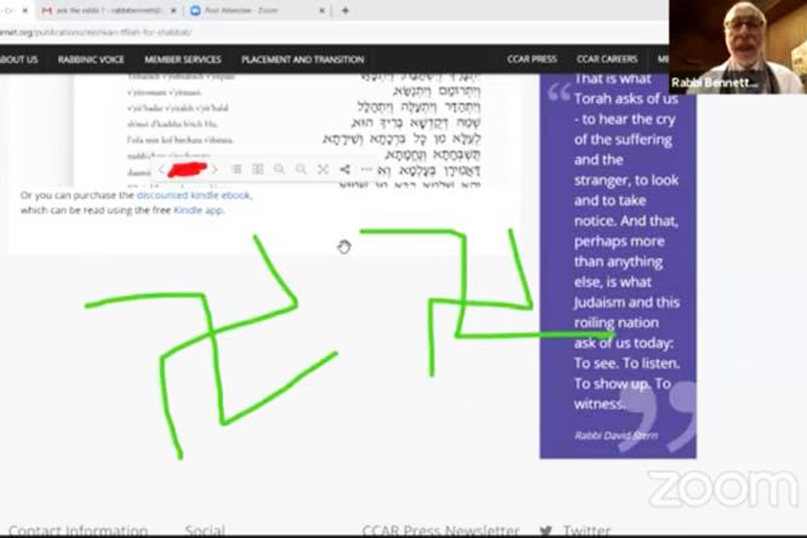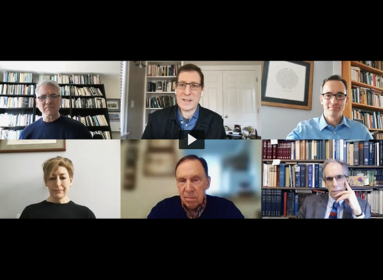
By Stacey Dresner
NEWINGTON – A Friday evening Shabbat service on Zoom, hosted by Temple Sinai of Newington earlier this month, was hacked into by someone who drew swastikas over the text of a prayer, and typed inappropriate messages into the Zoom chat box.
About 80 Temple Sinai members were logged into the July 10 service – or around 200 people, counting the families Zooming together – when, during the Mourner’s Kaddish, green swastikas appeared over the text of the prayer on the screen.
“I was scrolling on the screen to get to the Kaddish prayer – it was before we got to the names [of the deceased], thank God, and as I scrolled, all of a sudden there it was – three or four swastikas,” says Rabbi Jeffrey Bennett, Temple Sinai’s spiritual leader. “So right away I closed the screen; I stopped sharing and I said something like, ‘There is always a risk when you are online, but this also brings us together and that is what is important.’”
The perpetrator was apparently able to get into the open service us-ing the names of temple members on a list of Zoom meeting participants. They used the “Annotate” feature on Zoom that allows meet-ing participants to write on the screen as if it were a white board, for all attendees to see.
Bennett said that they had not known about the annotate feature but that they have now disabled it.
Besides drawing the swastikas, the perpetrator used a stereotypical caricature of a Jew with a large nose in one of the Zoom window screens and played klezmer music at one point. Using one member’s name they also wrote in the zoom chat, “Is this a funeral?” and then under another member’s name, “No, it’s an orgy.”
Rabbi Bennett said that the entire hacking incident lasted around 10 or 15 seconds, but as shocking as it was, it didn’t stop him from continuing the service.
“I went on. I read the names. We recited Kaddish, but I didn’t put it back up on the screen. We did Kiddush, HaMotzi and, as we always do, we finished with Tefilat HaDerech. I wanted to continue; I didn’t want to let that define our evening,’” Bennett says. “We took care of it in around five seconds, but it was shocking.”
Temple Sinai board president Jill Merriam Dulitsky was not in attendance at the July 10 service, but saw the incident later on Facebook Live.
“It’s disgusting and it’s so hateful. I can’t imagine someone would be so antisemitic that they would take the time to find a temple login and do this just for the pure goal of hate,” Dulitsky told the Ledger. “I felt particularly sad for the older members. Many of them have been sheltering in place for a longtime and this Friday night service has become so meaningful to them. It’s the one time they are together with community. I worry about them having seen this and not having any meaningful outlet to release any of the emotions that they have.”
The Newington and West Hartford Police departments were notified, as was the Anti-Defamation League’s Connecticut office, the FBI and the Jewish Federation of Greater Hartford and its Jewish Community Relations Council.
“The ADL has provided us with some technology resources and we are in the process of going through the resources to see if there is anything we can do to further enhance our security. And the Federation has been incredibly helpful,” reports Dulitsky.
Zoom-bombing plagues Jewish community
The incidence of antisemitic hacking has increased since the beginning of the pandemic, with numerous online religious services and meetings the target of “Zoom-bombing” by members of hate groups.
This includes a May Zoom Talmud class taught by Rabbi Shlomo Yaffe, formerly of Chabad of Greater Hartford, and now spiritual leader of Congregation B’nai Torah in Longmeadow, Massachusetts. In April, as 150 students at Yeshiva University were listening to the school’s president, Dr. Ari Berman, speak about Passover, hackers bombed the virtual chat with death threats and Holocaust references.
“This is a really a reminder of the importance of cyber-security,” says David Waren, executive director of the Jewish Federation of Greater Hartford. “Zoom has taken some steps to elevate security, and the Jewish Community, primarily through the Secure Communities Network (SCN) and the ADL, has been working with Jewish communities around the country to highlight best practices and try to create more awareness.
“Unfortunately what happened in Newington at Temple Sinai is not unique. We have seen a certain number of these incidents, although fewer to my knowledge in recent weeks as security has been stepped up both on the zoom platform as well as through basic security measures that Jewish organizations are increasingly taking as they have moved their events and services online,” he adds.
Elevating cyber security
Waren says that the Federation and SCN, which was created by Jewish Federations of North America and the Conference of Presidents of Major American Jewish Organizations, will hold a session on Zoom for Jewish community leaders in greater Hartford in the next few weeks, going over elevating cyber security “in part motiviated by what just occurred at Temple Sinai.”
The community is also working to raise funds for the position of a full-time security director to work with all of the Jewish organizations in the greater Hartford area on site security and training, as well as concerns like cyber-security, he reports.
Both Dulitsky and Bennett said that the incident isn’t going to prevent Temple Sinai from holding its services on Zoom.
“The rabbi and I agree that the show must go on and love will win over hate. We know there is an inherent risk in having online services but we are not going to shut them down,” Dulitsky says. “We are willing to take the risk, because the reward is so great to our community.”
“It’s not going to stop us,” agrees Bennett. “We are strong and we’re going to go from strength to strength. This has just made us stronger.”
Main Photo: Swastikas and antisemitic speech was inserted into Temple Sinai’s Zoom Shabbat service when it was hacked last Friday night, July 10.







 Southern New England Jewish Ledger
Southern New England Jewish Ledger













